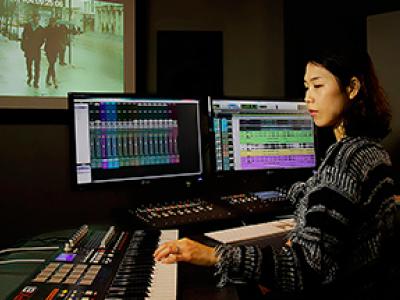What does a Music Director (Television) do?
There is no simple job description for television music directors; the types of shows they work on—as well as their contributions and responsibilities—are far too varied to sum up in a single phrase. Television music directors fall into three main categories based on the kind of show they work on: talk shows, talent competitions, or broadcast events.
Talk Show Music Directors
Within the larger group of television music directors, the most visible by far are house bandleaders on late-night television, many of whom (e.g., Questlove, Reggie Watts, Fred Armisen, and Jon Batiste) are celebrities in their own rights. These talk-show bandleaders typically double as sidekicks, bantering with the host and participating in comic bits on top of their musical duties, which include selecting and arranging the music used to introduce guests and bridge show segments; writing charts; rehearsing and leading the band during the show's taping; and sometimes accompanying musical guests.
Talent Competition Music Directors
In contrast, music directors for weekly talent competitions such as American Idol are off-screen creative forces who lead teams of arrangers, orchestrators, copyists, and instrumental players in the preparation and performance of music to accompany contestants. As a season progresses, music directors work personally with finalists, helping accentuate strengths and conceal limitations. As the final rounds of these competitions are typically broadcast live, music directors must be able to adapt quickly to changes, which may occur right before the show begins or even while it's happening.
Live Broadcast Event Music Directors
This category includes both one-time televised musical events and annual awards shows. One example is the monster curatorial job undertaken for a special televised event such as the Olympics opening ceremony. For an event like this, music directors must conceive, select, and prepare (in collaboration with the creative director) a program of music that reflects the host country's spirit and identity while also hitting certain dramatic marks. Similarly, an awards show such as the Oscars is a one-night affair requiring months of preparation by the music director, who—along with a handpicked creative team—composes, arranges, and rehearses the roughly 135 pieces of music that make up the show. These pieces are used in various ways: as presenter play-ons, as segues in and out of commercials, and as accompaniment for all of the awards categories.
At a Glance
This is a senior position on a television or event production team. Anyone breaking into the field of television music direction already has a long résumé as a player, arranger, composer, bandleader, or conductor. The specifics of one's career path vary based on the type of music direction. An instrumental player in a talk show band, for example, can progress to become first bandleader, and then hybrid bandleader/music director, of the show. On the other hand, the music director for a broadcast event doesn't need top-notch skills as an instrumental performer, but must have copious experience in event production, broadcasting, arranging, and personnel management.
Television music directors work for television networks, television producers, event producers, and creative directors. Due to the high level of responsibility inherent in a role like this, aspiring music directors must have a minimum of five to 10 years of experience working in and around the music side of the film and TV industries. Landing a first gig is largely a function of industry connections, while finding subsequent gigs has more to do with having a stellar reputation for consistency and effectiveness.
- Arranging
- Composition
- Bandleading
- Conducting
- Reading and writing music
- Instrumental proficiency (if playing in the band)
- Strong knowledge of all instruments
- Leadership
- Versatility
- Time management
This demanding job is suited to someone who is an effective leader and an avid team player—able to formulate and communicate a strong musical vision and then motivate colleagues to produce high-quality work under tight deadlines. Perhaps more importantly, however, music directors must be flexible and quick-thinking; in many cases, their success or failure is determined by their ability to adapt to and handle different ensembles, last-minute changes to the lineup or music, or even catastrophic equipment failures. The ability to remain cool under pressure is a must.
Like most musicians, music directors have a busy, high-intensity work life. A music director for a one-off televised event might spend several months of nonstop work, including on evenings and weekends, in preparation for the big day. On the other hand, the bandleader for a nightly talk show or talent competition is likely to have a more regular schedule, following the rhythms of the television season. For the most in-demand music directors, travelling overseas for events and filming is likely.







